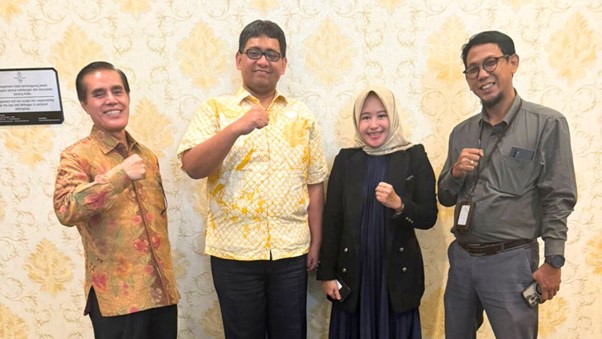AKKMI Supports the Development of Indonesian Cosmetic SMIs Initiated by the Ministry of Industry

Photo from left to right: Halim Nababan, AKKMI Advisory Board Member; Eko Prasetyo, Head of SMI Development Team for Chemical Products at the Ministry of Industry; Wiwik Puspita, AKKMI Member; Suhadi Rizky, AKKMI Member
Jakarta, - Halim Nababan, Advisory Board Member of the Indonesian Cosmetic Manufacturers Association (AKKMI), attended the 2024 Cosmetic Small and Medium Industries (SMI) development evaluation meeting organized by the Ministry of Industry of the Republic of Indonesia on November 7, 2024, at Hotel Savero Style, Bogor City.
The event proceeded solemnly and was attended directly by cosmetic union institutions in Indonesia, namely the Head of Industry Division of the Indonesian Cosmetics Companies Association (PERKOSMI) Dr. Liandhajani, Indonesian Essential Oils Council (DAI) Member Feri Agustian, and the Leader of Stylo Indonesia, Ridho Nugroho.
Growth Potential of the Cosmetic Industry in Indonesia
The 2024 Cosmetic SMI development evaluation meeting held by the Ministry of Industry aims to achieve an economic growth target of 8% across various industries, particularly in the cosmetics sector. This is because the cosmetics market growth in Indonesia is considered substantial and is expected to continue developing in the future.
The evaluation meeting showed that the cosmetics industry growth in Indonesia reaches 4.86% per year. This is a significant figure for the development of the cosmetics industry in Indonesia.
AKKMI's Support for 2024 Cosmetic SMIs and Challenges Faced by the Indonesian Cosmetic Industry
Seeing the great potential in Indonesia's cosmetic industry, AKKMI fully supports the government's efforts to develop 2024 Cosmetic SMIs. The focus is no longer solely on targeting the global market but on expanding the domestic market first.
According to Halim, Indonesia has significant potential as part of the global market. He explained, "The cosmetic market doesn't always have to look outward; Indonesia's market itself is very large, and Indonesia is also part of the global market. We should be able to expand or strengthen the domestic market first."
Furthermore, Halim also highlighted constraints often faced by beauty industry players, such as high costs for certification labs. The government could collaborate with universities to support laboratory testing. However, not all universities have adequate facilities, and this is where the government's role is needed to help provide the necessary laboratory facilities.
Limited knowledge and technology in the production process also become obstacles in creating products that can compete in the global market. Relatively high certification and licensing costs add to the challenges for SMI players who want to increase their product credibility.
Additionally, access to quality local raw materials remains limited. Dependence on imported raw materials remains high, while price fluctuations often burden SMI players.
"The government is expected to give more attention to domestic suppliers and support their development to strengthen Indonesia's cosmetic industry. This could be done by opening local supplier events to support them," Halim added.
Another challenge concerning beauty business players is the prevalence of imported products in Indonesia, especially products with unclear safety standards and tend to make excessive claims. The abundance of foreign products flooding the Indonesian market remains a frequent obstacle in the beauty industry.
Halim Nababan also stated that solid collaboration between the government and business players is key in facing these challenges.
"AKKMI is ready to contribute to advancing cosmetic SMIs in Indonesia by providing the support they need to develop, whether through training, market access, or collaboration with various parties. We are optimistic that with good cooperation, local cosmetic products will be increasingly sought after and valued at the global level, despite various challenges that we need to overcome together," he explained.